


How to become a confident motorcyclist
A story by Jim McDermott
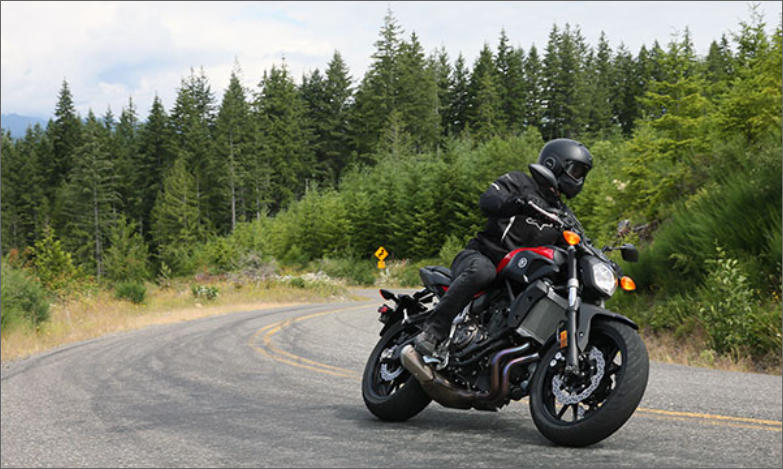
Are You A Confident Motorcyclist? While a very rare few of us are born with natural ability on a motorcycle,
the majority of riders learn by doing. We try to avoid mistakes, especially painful ones, keep our eyes and ears
open, and hopefully become mature in our abilities. Even the best of us can make mistakes, or have bad luck,
no matter how long we’ve been riding. But how did we evolve from that timid newbie, cautiously releasing the
clutch so as not to stall the bike AGAIN, into the motorcyclists we are now (or who we want to be), brimming
with confidence? Here are a few of the things we learned along our journey about how to become a confident
motorcyclist:
1) Ride, Wash, Repeat When it comes to gaining confidence on a motorcycle, there is no substitute for saddle
time. When I first started riding on the road, someone I trusted told me “get through the first 100 miles, and if
you don’t hurt or scare yourself, then get 1000 miles under your belt. When you hit 1000 miles you’ll know if
you’re a biker or not.” He was right – those first 100 miles were thrilling, the learning curve steep. By the time
I hit 1000 miles, I was addicted. I noticed that as my miles of experience increased, my riding got smoother.
I anticipated things instead of just reacting. As the years rolled on, I noticed that I felt most confident in those
years where I clicked off the most miles. It makes absolute sense – practice makes perfect!
2) Ride Lots Of Different Types Of Bikes I started on a 1985 Honda V30 Magna; bit of an odd bike, chain
driven V-Four 500cc Cruiser. Put about 10,000 miles on it in two years, then got a 1993 Ducati 900ss. Those
bikes were chalk and cheese – everything on the Ducati was “more”, it was faster handled better, stopped better,
it demanded a lot more of my attention. Riding it made me a more confident rider (eventually), as it challenged
me a bit, and I had to adapt to it. Later, I owned a KTM 950 Adventure, and a Honda GL1800 GoldWing, again,
totally different riding dynamics. But riding these various types of bikes increased my “knowledge envelope”, and
enabled me to think differently about all the dynamics of riding a motorcycle. If you’ve only ridden one type of
bike, it’s a bit like only speaking one language….you will have a better understanding of the world (in this case
the world is motorcycling of course) if you speak a few languages, or at least visit other countries.
3) Ride In All Sorts Of Weather Conditions Get out and ride in the wet, the cold, at night, in the fog, in the
blazing heat. Learn how to deal with these conditions before you’re on a quiet ride and get caught out. Riding
in challenging conditions requires specialized skills that can only really be learned via experience. How will the
bike react to hard braking in the wet? How much traction do you have when your tires are cold? How do
extreme temperatures effect your attention and physical ability? Gain this knowledge and you will be confident
no matter what the weather does (and btw, it’s OK to park the bike and stride confidently into a cafe if it’s
hammering down, we do all the time!).
4) The Day You Stop Riding Is The Day You Stop Learning
No matter how many miles you’ve done, no matter how old you
are, you can learn something valuable every time you strap your
helmet on. But you have to be receptive to the lessons – after
you hit a certain skill level as a rider, it’s easy to start thinking
you’ve got it nailed. But we can always improve, whether it’s
body positioning, smoothness, balance, etc. Approach your ride
with intent; know what you’d like to improve and commit to
working on it while you ride. Of course, the road can always
throw lessons your way when you least expect it, so being truly
present on the bike is essential.
5) Wear The Right Gear It’s amazing how much confident a good bit of kit can give you. After years of riding with
cobbled together riding gear, I bought a riding suit. It was crazy expensive, but I got nearly a decade out of it, and
every time I put it on, I felt invincible. Same thing with a great helmet and boots; if you buy ill fitting, cheaply
made gear, you really aren’t saving any money in the long run. Knowing your gear is up to the challenge and being
comfortable wearing it provides peace of mind and increased confidence every time you ride.
6) Ride Offroad Riding in the dirt teaches you how to deal with variable traction, obstacles, and requires you to be physical on the bike. You might not
need these skills every time you ride on the street, but eventually a situation will arise when you will. Riding off road will program these skills into your
brain, and they become an automatic response. It’s simple: if you know how to control a bike that’s lost traction off road, then if it happens to you on
road, you won’t freak out: you’ll apply those skills, without thinking about it. All the top guys in MotoGP train on off road motorcycles, and those guys are
the best in the world.
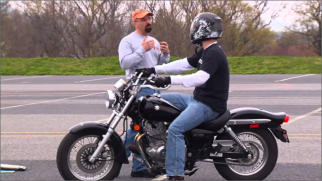
SOCIAL
SHARE WITH US
Copyright © 2024 - Ozark Rides, All Rights Reserved





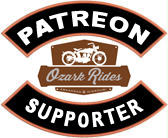
Get Access & Benefits!
Become a Patron!
Or


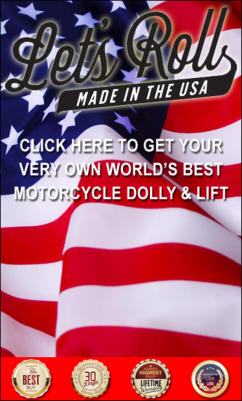





Copyright © 2024 - Ozark Rides, All Rights Reserved


How to become a confident
motorcyclist
A story by Jim McDermott
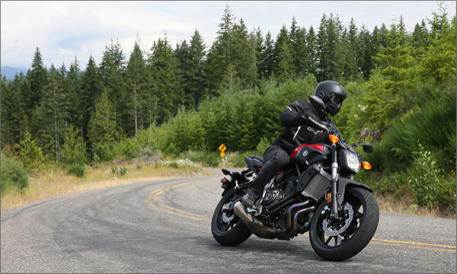
Are You A Confident Motorcyclist? While a very rare few of
us are born with natural ability on a motorcycle, the majority of
riders learn by doing. We try to avoid mistakes, especially
painful ones, keep our eyes and ears open, and hopefully
become mature in our abilities. Even the best of us can make
mistakes, or have bad luck, no matter how long we’ve been
riding. But how did we evolve from that timid newbie, cautiously
releasing the clutch so as not to stall the bike AGAIN, into the
motorcyclists we are now (or who we want to be), brimming with
confidence? Here are a few of the things we learned along our
journey about how to become a confident motorcyclist:
1) Ride, Wash, Repeat When it comes to gaining confidence
on a motorcycle, there is no substitute for saddle time. When I
first started riding on the road, someone I trusted told me “get
through the first 100 miles, and if you don’t hurt or scare
yourself, then get 1000 miles under your belt. When you hit
1000 miles you’ll know if you’re a biker or not.” He was right –
those first 100 miles were thrilling, the learning curve steep.
By the time I hit 1000 miles, I was addicted. I noticed that as
my miles of experience increased, my riding got smoother.
I anticipated things instead of just reacting. As the years rolled
on, I noticed that I felt most confident in those years where I
clicked off the most miles. It makes absolute sense – practice
makes perfect!
2) Ride Lots Of Different Types Of Bikes I started on a 1985
Honda V30 Magna; bit of an odd bike, chain driven V-Four 500cc
Cruiser. Put about 10,000 miles on it in two years, then got a
1993 Ducati 900ss. Those bikes were chalk and cheese –
everything on the Ducati was “more”, it was faster handled
better, stopped better, it demanded a lot more of my attention.
Riding it made me a more confident rider (eventually), as it
challenged me a bit, and I had to adapt to it. Later, I owned a
KTM 950 Adventure, and a Honda GL1800 GoldWing, again,
totally different riding dynamics. But riding these various types
of bikes increased my “knowledge envelope”, and enabled me to
think differently about all the dynamics of riding a motorcycle.
If you’ve only ridden one type of bike, it’s a bit like only
speaking one language….you will have a better understanding of
the world (in this case the world is motorcycling of course) if you
speak a few languages, or at least visit other countries.
3) Ride In All Sorts Of Weather Conditions Get out and ride
in the wet, the cold, at night, in the fog, in the blazing heat.
Learn how to deal with these conditions before you’re on a quiet
ride and get caught out. Riding in challenging conditions
requires specialized skills that can only really be learned via
experience. How will the bike react to hard braking in the wet?
How much traction do you have when your tires are cold? How
do extreme temperatures effect your attention and physical
ability? Gain this knowledge and you will be confident no matter
what the weather does (and btw, it’s OK to park the bike and
stride confidently into a cafe if it’s hammering down, we do all
the time!).
4) The Day You Stop Riding Is The Day You Stop Learning
No matter how many miles you’ve done, no matter how old you
are, you can learn something valuable every time you strap your
helmet on. But you have to be receptive to the lessons – after
you hit a certain skill level as a rider, it’s easy to start thinking
you’ve got it nailed. But we can always improve, whether it’s
body positioning, smoothness, balance, etc. Approach your ride
with intent; know what you’d like to improve and commit to
working on it while you ride. Of course, the road can always
throw lessons your way when you least expect it, so being truly
present on the bike is essential.
5) Wear The Right Gear It’s amazing how much confident a
good bit of kit can give you. After years of riding with cobbled
together riding gear, I bought a riding suit. It was crazy
expensive, but I got nearly a decade out of it, and every time I
put it on, I felt invincible. Same thing with a great helmet and
boots; if you buy ill fitting, cheaply made gear, you really aren’t
saving any money in the long run. Knowing your gear is up to
the challenge and being comfortable wearing it provides peace
of mind and increased confidence every time you ride.
6) Ride Offroad Riding in the dirt teaches you how to deal with
variable traction, obstacles, and requires you to be physical on
the bike. You might not need these skills every time you ride on
the street, but eventually a situation will arise when you will.
Riding off road will program these skills into your brain, and
they become an automatic response. It’s simple: if you know
how to control a bike that’s lost traction off road, then if it
happens to you on road, you won’t freak out: you’ll apply those
skills, without thinking about it. All the top guys in MotoGP train
on off road motorcycles, and those guys are the best in the world.
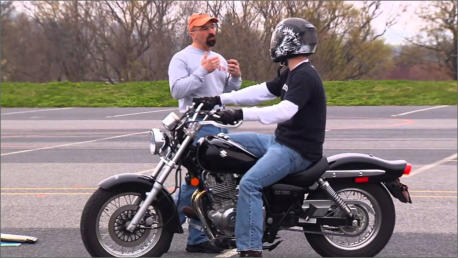



Get Access & Benefits!
Become a Patron!
Or






MENU






